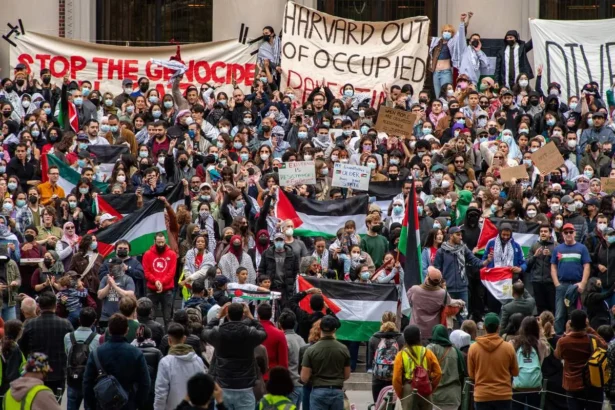The incoming Trump team appears poised to take a hardline and Congress isn’t far behind. And it’s just not on college campuses.
By Ben Armbruster, Reposted from Responsible Statecraft
As one administration exits and another takes form, a harsh reality is becoming clear for critics of maintaining U.S. support for the Israeli government: in government bureaucracies and university campuses alike, crackdowns and pressure on free expression and assembly will continue in force.
Precisely how the incoming Trump administration will handle such criticism remains to be seen — but views expressed by his congressional allies and recent cabinet picks suggest a further diversion from upholding freedoms of speech and assembly in the name of maintaining support for Israel’s war on Gaza and beyond.
Most recently, Trump selected Pam Bondi as his new nominee for attorney general. Last year, Bondi told Newsmax that students demonstrating in support of Hamas should be deported, whether they are here on student visas or as American citizens.
“Frankly, they need to be taken out of our country,” Bondi said. “Or, the FBI needs to be interviewing them right away.”
Trump himself echoed similar sentiments on the campaign trail, telling a group of donors in May that he would “throw out” any student who protests for Palestine and calling on the Biden administration to revoke the visas of foreign nationals who “support Hamas.”
Trump’s congressional allies have echoed the same sentiments in recent weeks. In October, House Majority Leader Steve Scalise (R-La.) met with members of the American Israel Public Affairs Committee (AIPAC) during which he threatened to revoke accreditation to universities that allow purported pro-Hamas or anti-Israel sentiment. Scalise discussed the various “levers” and “tools” by which the government can crack down on universities, even threatening their existence altogether.
“Clearly this administration doesn’t care, but if you get an administration that actually says ‘we’re not going to play the game anymore,’ there’s a lot of levers and tools that will get [universities’] attention, day one,” Scalise said. “Your accreditation is on the line, you’re not playing games anymore or else you’re not a school anymore.”
The hour-long meeting was framed as a discussion about antisemitism, but no one present attempted to differentiate between prejudice against Jews and criticism of the Israeli government and its actions. Scalise also slammed Jewish students who criticize Israel, asserting that they “just feel guilty that they’re alive.”
Despite Scalise’s accusations of Democratic apathy, and while the harshest rhetoric against universities has come from Republicans, crackdowns on criticism of Israel remain a bipartisan status quo in Washington. In the last year, lawmakers on both sides of the aisle have pushed for punishment of pro-Palestinian voices and protesters.
In response to last spring’s widespread college protests, encampments, and disruptions, the House overwhelmingly (320-91) passed S. 4127, the bipartisan Antisemitism Awareness Act, on May 1. The bill expands and codifies the definition of antisemitism to include “targeting of the state of Israel, conceived as a Jewish collectivity.”
Rep. Jerry Nadler (D-N.Y.) was one of 70 Democratic House members who voted against the bill, with 133 in favor.
“Speech that is critical of Israel alone does not constitute unlawful discrimination. By encompassing purely political speech about Israel into Title VI’s ambit, the bill sweeps too broadly,” he said in an April 30 hearing on the bill.
In the eyes of Tyler Coward, Lead Counsel on Government Affairs at the Foundation for Individual Rights and Expression (FIRE), references to a foreign nation becoming a proposed exception to free speech protection is a worrying concept.
“Our Constitution and First Amendment jurisprudence hold that political speech is entitled to the most robust protections under the First Amendment, and that’s including speech and expression about foreign policy or foreign states,” Coward said. “Inclusion of references to Israel itself triggers those concerns right out of the gate.”
However, efforts to constrain or police speech about Israel are nothing new. Many hawkish Israel supporters have pushed for years to expand what anti-semitism entails in federal anti-discrimination law, often along the lines of the definition laid out by the International Holocaust Remembrance Alliance. That definition says charges of antisemitism “might include” criticism of Israel.
“The goal here has long been to refocus the fight against antisemitism — and there is real antisemitism out there, which needs to be fought — to redefine it and make the central focus of this battle the shutting down of criticism of Israel and anti-Zionism,” said Lara Friedman, the president of the Foundation for Middle East Peace.
Friedman has spent years documenting legislative and lobbying efforts in the U.S. to restrict speech on Israel and pass the IHRA definition into federal law. Many states have already passed resolutions or adopted laws to embrace this framing, according to the Foundation’s data.
“This has been fought since long before October 7, and it hasn’t passed in Congress because it is so obviously controversial,” Friedman said. “You have major organizations that are not Israel-focused that have come out and said this would massively violate free speech.”
The antisemitism bill has been stalled in the Senate for months, so its definition of antisemitism is not yet the legal standard. However, Senate Majority Leader Chuck Schumer recently proposed adding the legislation to the 2025 National Defense Authorization Act (NDAA).
“Schumer wants to put it on the NDAA, basically saying, ‘I want this to pass, but I don’t want to force Democrats to vote on it because some will vote against it, and then they’ll call Democrats bad on antisemitism,’” Friedman told RS. “And [Republican Speaker of the House Mike] Johnson is saying, ‘No, we have to have an up-or-down vote and force the Democrats all to vote on it.’”
The proposal’s resurgence was not the only way Congress worked to police criticism of Israel on college campuses this past year. Shortly after the Antisemitism Awareness Act was introduced, members of the House Committee on Education and the Workforce aggressively questioned several university presidents at length about alleged antisemitism on their campuses. Republican members, in particular, notably including Rep. Elise Stefanik (R-NY), Trump’s nominee for U.N. ambassador, leveled harsh accusations against the witnesses, calling them weak and demanding to know why so few students have been suspended and professors fired for their participation in pro-Palestinian protests.
“Those who are in charge of universities who negotiate with pro-terror protesters are not doing their jobs,” Chairwoman Virginia Foxx (R-N.C.) declared in opening the hearing.
To the ire of the committee, the three presidents dodged some questions and provided opaque answers for others. Changes this semester, however, suggests that the pressure had its intended effect.
Colleges across the country have significantly restructured their speech, expression, and assembly rules to crack down on demonstrations. As the fall term began, Columbia University, for example, restricted access to its main campus. Northwestern University adopted a new demonstration and free speech policy, declaring that no one “may disrupt, prevent, or obstruct, or attempt to prevent or obstruct the regularly scheduled activities of the University.”
On November 20, a small group of tenured faculty deliberately violated Northwestern’s new policies by hosting a small protest at “the Rock,” a central square on campus. The demonstration rules prohibit protests at the Rock before 3 p.m. on weekdays. History professor Helen Tilley, one of the attendees, described why she felt a personal responsibility to participate.
“I believe that my privileges of free speech and academic freedom also come with obligations to stand up for people who have less power and who are already being punished by the changes in rules that I do not consider fair,” Tilley said.
Moreover, the New York Times recently revealed that 950 campus protest events have taken place this semester, in comparison to 3,000 last semester. About 50 people have been arrested so far this fall, compared to 3,000 in the spring.
Four students from the University of Illinois at Urbana-Champaign recently attended two pre-trial hearings. The students face up to three years of incarceration on felony “mob action” charges for their participation in campus encampments.
Also this week in Virginia, police raided the home of two George Mason University students associated with Students for Justice in Palestine regarding a spray-paint incident that, according to the Intercept, was “part of the widespread campus protests related to Israel’s war on Gaza.” The school’s SJP chapter was shut down and the students were barred from campus for four years.
Ben Armbruster is the Managing Editor of Responsible Statecraft. He has more than a decade of experience working at the intersection of politics, foreign policy, and media. Ben previously held senior editorial and management positions at Media Matters, ThinkProgress, ReThink Media, and Win Without War.
RELATED:
- The Israel-Affiliated Organization Leading the Backlash Against Student Protests
- Unmasking counterprotesters who attacked UCLA’s pro-Palestine encampment
- Detailed study finds 99% of pro-Palestine protests at US universities are peaceful
- Giraldi: Students Are Taking the Lead in Denouncing Gaza Atrocities
- (VIDEO) Col. Douglas Macgregor: US seen as taking orders from Netanyahu
- Biden’s war on Gaza is now a war on truth and the right to protest
- The Israel-Affiliated Organization Leading the Backlash Against Student Protests
- Will the Israel Lobby Cause America’s Downfall?





